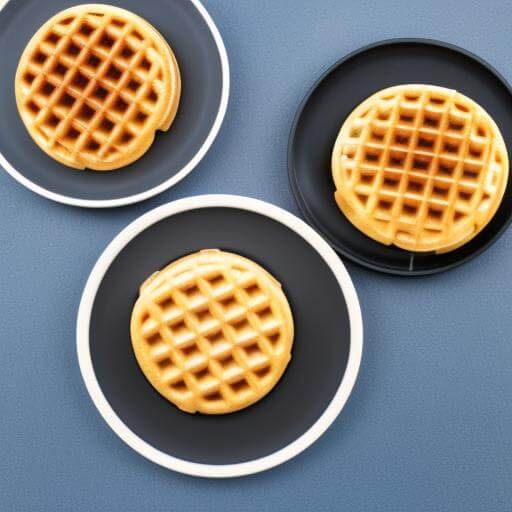Since I have owned several dogs in the past, I’m well aware that dogs have a tendency to be opportunistic feeders, meaning they’ll eat pretty much anything they can get their paws on. However, I’ve also learned that not all human foods are safe for dogs, and Eggo waffles are definitely on that list.
Table of Contents
- 1 Understanding A Dog’s Nutritional Needs
- 2 Ingredients In Eggo Waffles
- 3 Potential Risks Of Feeding Eggo Waffles To Dogs
- 4 Safe Alternatives To Eggo Waffles For Dogs
- 5 How To Introduce New Foods To Your Dog
- 6 Signs Of Allergic Reactions In Dogs
- 7 Consulting With A Veterinarian On Your Dog’s Diet
- 8 Keeping Your Dog Healthy And Happy
Understanding A Dog’s Nutritional Needs
I discovered very quickly that you should understand your dog’s nutritional requirements before feeding your dog any human food. From my experience, I know my dog requires a diet that is high in protein and fat, as these nutrients give him the energy he needs to go for walks and play fetch. Also my dog also requires the essential vitamins and minerals that are commonly found in high-quality dog food to boost his immune system.
When it comes to human food, dogs should only be given small amounts of lean meat or vegetables as a treat. Giving your dog too many table scraps or highly processed foods like frozen Eggo waffles can lead to digestive upset or even more serious health problems over time. In some cases, certain ingredients found in human food may even be toxic for dogs.
So the best way to ensure that your furry friend is getting the required nutrients they need is by feeding them high-quality dog food specifically designed for their size and breed. If you’re looking for creative ways to spice up their meal routine or give them a special treat occasionally, consider consulting with your veterinarian first before offering any human food as a snack.
Ingredients In Eggo Waffles

In addition to processed white flour and vegetable oil, Eggo waffles also contain a considerable amount of sodium. Dogs should have no more than 100mg of sodium per day for every ten pounds of body weight. Consuming too much sodium can lead to dehydration and other health issues.
While plain frozen or toaster waffles without chocolate or xylitol are safe for dogs to eat in moderation, it’s important to remember that dogs have sensitive digestive systems. Too much sugar can lead to weight gain and diabetes in dogs. Therefore, even moderate consumption of Eggo waffles is not recommended.
Potential Risks Of Feeding Eggo Waffles To Dogs
Feeding Eggo Waffles to dogs can pose several risks that pet owners should be aware of. These waffles are high in carbs, sugar, and fat content, which can lead to obesity, diabetes, dental problems, cardiac diseases, and hypertension if consumed on a daily basis. Also the sugar and syrup used as toppings on Eggo Waffles can also be harmful to dogs.
While plain frozen or toaster waffles without chocolate or xylitol may seem like a safe option for dogs to consume in moderation, it’s essential to consider the amount of sugar and dairy present in them. Too much sugar or dairy in regular waffles can cause gastrointestinal distress or upset in dogs. Also whole grain waffles may provide fiber and protein but still contain harmful amounts of sugar and fat.
It’s also important to consider any food allergies or intolerances your dog may have regarding gluten or lactose consumption since consuming these types of waffles can aggravate allergy symptoms such as stomach issues. Pet owners must monitor their dog’s diet carefully and consult their veterinarian before introducing any new foods into their pet’s diet.
Safe Alternatives To Eggo Waffles For Dogs
Though dogs can eat plain frozen or toaster waffles like Eggo waffles once in a while, it is important to be aware of their ingredients before feeding. Waffles with chocolate or xylitol can pose serious health risks to dogs, including seizures and kidney failure. Also the toppings used on waffles such as sugary syrups and fruits like grapes can also be harmful to dogs.
It is important to note that while plain waffles are generally safe for occasional consumption by dogs, they should not be fed regularly due to their high content of “bad” fats and sodium. Instead, consider making healthier alternatives for your furry friend using nutritious ingredients like mashed bananas or blueberries alongside xylitol-free peanut butter or yogurt toppings.
One safe alternative to Eggo waffles for dogs includes simple homemade dog treats made from wheat flour, oats, eggs, vegetable oil, and low-fat milk. These treats offer both taste and nutrition without any unhealthy additives commonly found in store-bought waffles.
How To Introduce New Foods To Your Dog
Introducing new foods to your dog can be a tricky process. It’s important to do it gradually to avoid any negative reactions or discomfort for your furry friend. The best way to start is by mixing small amounts of the new food with their current diet and increasing it slowly over time.
It’s important to note that some commercially produced waffles may contain harmful additives and preservatives for dogs. Plain waffles, on the other hand, can be safe in moderation but only if they do not have any toppings like syrup or chocolate. Waffles are high in sugar, carbs, and fat so they should only be given as occasional treats.
When introducing a new food, always check the ingredients label for xylitol or chocolate which can be toxic for dogs. Also keep an eye out for any reactions from your dog such as an upset stomach or diarrhea.
Signs Of Allergic Reactions In Dogs
Dogs can experience allergic reactions just like humans. It is important to know the signs of these reactions to seek immediate medical attention for your furry friend. The following are some common symptoms of allergic reactions in dogs:
1. Skin problems: Allergic dogs may experience itchiness, hives, red inflamed skin, and atopic dermatitis which causes itchy skin.
2. Gastrointestinal symptoms: Dogs may vomit or have diarrhea as a result of an allergic reaction.
3. Nasal symptoms: Sneezing, runny nose, and congestion are also signs that your canine may have an allergy.
4. Anaphylaxis: This severe reaction includes excessive salivation, vomiting or diarrhea, difficulty breathing, and blue-colored skin that will require emergency vet care.
5. Hair loss and scratching: Constant itching may lead to hair loss if left untreated.
6. Swelling in different body parts such as the feet or face is also a symptom to look for.
Some foods tend to trigger allergies in dogs more than others like chicken, beef, eggs, corn, wheat, milk, and soy. To prevent this, it’s important to read through the ingredients of any dog food and treats you’re purchasing for them. You should take note of what they’ve eaten when any signs arise so you can discuss this with your veterinarian during checkups if need be.
Consulting With A Veterinarian On Your Dog’s Diet
Consulting with a veterinarian on your dog’s diet is crucial to ensuring its overall health and well-being. Every dog has different nutritional needs based on their breed, size, age, and activity level. A professional veterinarian can provide personalized advice on what type of food to feed your dog and how much to give them.
When consulting with a vet about your dog’s diet, it’s important to bring up any concerns or questions you may have. They can guide you through the different types of dog food available (dry kibble, wet food, raw food, etc.) and recommend which ones are best for your furry friend. It’s also important to discuss any allergies or dietary restrictions that your dog may have.
Also veterinarians can advise on proper portion sizes and feeding schedules. Overfeeding can lead to obesity and other health problems such as heart disease or joint pain. Ensuring that your dog is receiving the right amount of food for their size and activity level is important in maintaining their optimal health.
Keeping Your Dog Healthy And Happy
While dogs can eat eggo waffles as a treat in moderation, they are high in sugar and fat which can lead to weight gain and other health issues if not consumed cautiously. Belgian waffles are generally safe for dogs as long as they do not contain chocolate or xylitol, which is toxic to dogs.
Plain waffles are a better option for your canine companion than sweetened varieties. While the processed white flour and refined sugar found in waffles can be harmful if consumed in large amounts, plain waffles without toxic toppings like syrup or fruits are safe for dogs when given as an occasional treat. Waffles may also contain eggs and milk that are generally safe for most dogs, but owners should be aware of potential allergies or lactose intolerance.
Remember that introducing new foods into your dog’s diet should always be done with caution. Keeping a close watch on their digestive system after feeding them something new is essential. Dogs have different nutritional needs compared to humans, so consulting with a veterinarian before giving them anything you’re unsure of could save you the stress of watching them suffer from discomforts caused by eating something inappropriate.
While giving Eggo Waffles may sound like an exciting treat for your pup, it’s best when kept moderate because of its high levels of sugar and fat content. Other types such as Belgian or Plain Waffles could serve safer alternatives; however, owners must ensure that these do not contain toxic ingredients like chocolate or xylitol nor harmful toppings like syrup or fruit chunks that present risks to the dog’s health. Always feed new food items sparingly at first by observing if negative symptoms develop after consumption.


